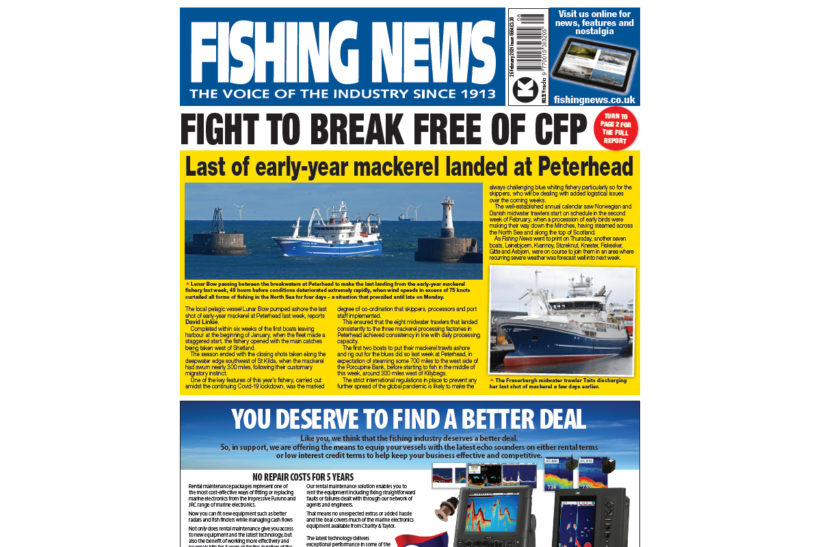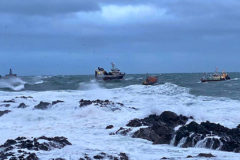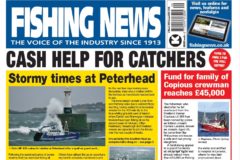EU tries to bind UK to CFP in fisheries talks
Major battle as EU tries to undermine UK
The EU is trying to dilute the UK’s rights as a sovereign coastal state and to bind the UK into the CFP – both its existing rules and any future rules, reports Tim Oliver.
This is the claim being made by the NFFO as vital talks between the UK and EU to set fishing opportunities in 2021 indicate how relations may shape up in the future.
A ‘major battle looms’, says the federation, as the EU seeks to undermine and dilute the UK’s right to set its own regulations in the UK EEZ, while simultaneously paying lip service to it.
The shape of things to come is emerging during the online talks, where industry representatives have access to the online plenary sessions.
The primary task in the annual negotiations is to set TACs for shared stocks, but the NFFO says that in the opening sessions, the EU has ‘repeatedly emphasised convergence’ between the UK and EU. “It is clear that the EU’s strategic objective is to bind the UK back into the CFP – both existing CFP rules and any future CFP rules that the EU may adopt,” said chief executive Barrie Deas.
He said the EU can no longer attach extra conditions to the EU TACs and quotas regulations to restrict fishing as it has done in the past, because the regulations no longer apply to the UK. “The EU is therefore manoeuvring to trap the UK into accepting strong linkages between TACs and an array of additional measures.
“As this is the first set of annual fisheries negotiations in which the UK is acting as an independent party, both sides recognise that more is at stake than just the arrangements for 2021 – important as they are.”
He said that the EU’s objective to tie the UK into the CFP is in ‘diametrical opposition’ to the UK’s stated intentions as it left the EU to diverge from the CFP and ‘forge a new destiny’. The new UK Fisheries Act 2020 provides the means to do this.
Both sides are seeking leverage in the talks and ‘on the issues of substance, this trial of strength is apparent’, said the NFFO chief.
Quota exchanges
The time taken to reach agreement, and quota exchanges, are two central issues in this respect. Both parties have emphasised the importance of reaching a quick settlement, as these negotiations would normally be finalised before the end of the previous year. “A calculation then ensues as to which side will be most damaged by a delay,” said Barrie Deas.
On quota exchanges, he said that the fishing industries on both sides would benefit from early agreement on the exchange of unused quota.
But it is clear that the EU calculates that delaying agreement on quota exchanges, perhaps until later in the year in an ‘as yet undefined process using yet-to-be-established specialised committees’, will give the EU more leverage over the UK in other parts of the agreement.
“This is a dangerous game for both UK and EU fleets, which risk being left short of the quota that they need for the rest of the year,” said Barrie Deas.
Adding that the first post-Brexit annual negotiations ‘were never going to be easy’, he said: “The EU’s stress on co-operation, collaboration, convergence and the benefits of continuity masks its ambition to bind the UK as closely as possible to the status quo – the CFP.”
He added that despite the UK having given away its ‘strongest card’ – access to EU vessels to fish in UK waters – the UK still has two important levers: it can negotiate as an independent party, and it can control the rules it can apply to all vessels fishing in UK waters.
“Important as the decisions in these negotiations are for fishing businesses in 2021, there is a larger trial of strength underway – one that will determine the future for the next five and a half years, and possibly beyond.
“The outcome of these talks will provide an indication on whether the UK has broken free of the CFP – despite continuity on access and minimal change on quota shares – and intends to forge its own path ahead, or whether the UK remains as a satellite within the CFP orbit.”
Issues on the table
Major issues linked to the ongoing talks are the landing obligation/discards ban, non-TAC fisheries, sea bass, and Celtic Sea and Irish Sea technical measures.
Describing the landing obligation as ‘the biggest current threat to the sustainable management of our mixed demersal fisheries’, Barrie Deas said that the EU is not likely to change ‘this flawed piece of legislation’ before the next review of the CFP because it would involve too much loss of face.
The UK has signalled it will amend the UK’s version of the landing obligation ‘at the earliest opportunity, whilst retaining the principle of minimising unwanted catch’, he said – but in the meantime it remains part of EU retained law.
“This opens up another area of potential divergence which the EU would like to close down,” said Barrie Deas.
Although the main business of the annual negotiations relates to TAC setting, the Brexit deal binds the EU and UK to set tonnage limits on the take of non-quota stocks in each other’s EEZ.
The mechanics of how this will be managed will be the business of specialised committees – as will quota exchanges if they are not agreed during the negotiations – but some elements are under discussion within the current negotiations.
“Sea bass is another area in which the EU seeks to bind the UK into its existing approach,” said Barrie Deas.
“The UK has signalled its intention to make a number of modest and scientifically justified adjustments to the rules – either as part of the annual agreement or independently in UK waters.”
The UK has also proposed a set of selectivity measures for vessels operating in the Celtic and Irish seas. The issue between the parties is whether the EU will agree to them, or whether the UK will apply them autonomously in its own waters.
Exports and Covid add to problems
The NFFO also points out that the complex talks are taking place against the background of ‘continuing impediments to the export of fish and shellfish into the EU’ and the Covid pandemic.
“Higher costs and a dramatic increase in the quantity and complexity of customs documentation are part and parcel of the UK’s decision to leave the single market and customs union,” said Barrie Deas.
“Work is ongoing – principally through the twice-weekly meetings of the exporters stakeholders’ group – to resolve the outstanding issues.”
And because of Covid, the annual negotiations are taking place ‘entirely remotely, and this imposes important limitations and pressures in this strange and hopefully atypical year’, said the NFFO.
Agreement may not be possible
“On the trajectory that the parties are currently on, a point will arrive when it becomes clear that – despite all efforts – an agreement for 2021 is not possible,” said Barrie Deas.
If that happens, each side would set its own quotas for 2021 – there are rules in the Brexit agreement on how this would be done. Each side would set non-discriminatory conditions for all vessels fishing in its waters.
And while the UK-EU talks are underway, also taking place are parallel talks between the UK, EU and Norway, and between the UK and Norway, the EU and Norway and the UK and Faroes.
“As there can be important potential linkages between the different sets of negotiations, from the outside the different interlinked talks can look like multi-dimensional chess,” said Barrie Deas.






